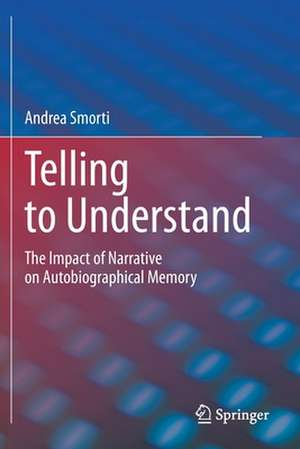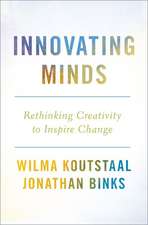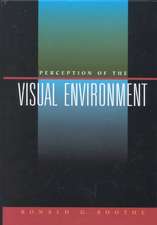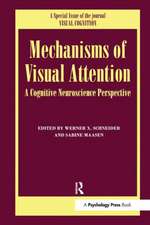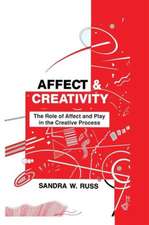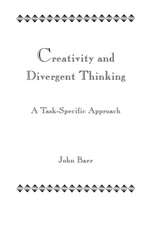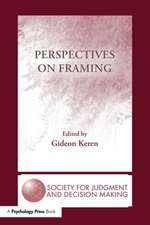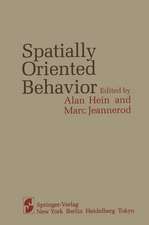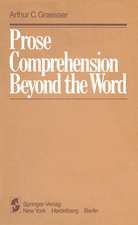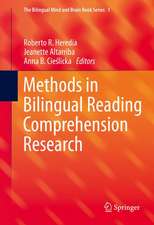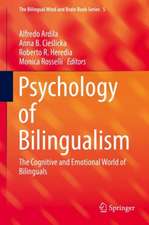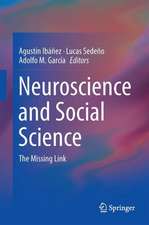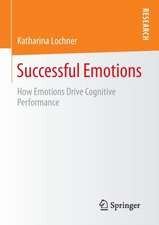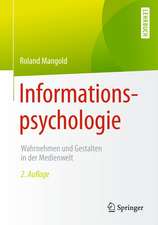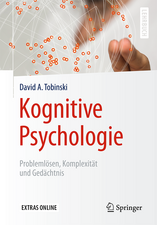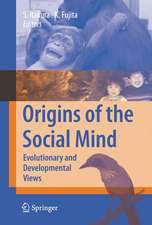Telling to Understand: The Impact of Narrative on Autobiographical Memory
Autor Andrea Smortien Limba Engleză Paperback – 24 iun 2021
Telling to Understand will be of interest to researchers and students in cognitive science, psychology, literary studies, philosophy, education, and educational technology, as well as any reader interested in enlarging their concept of narrative and how narrating modifies the self.
| Toate formatele și edițiile | Preț | Express |
|---|---|---|
| Paperback (1) | 725.75 lei 6-8 săpt. | |
| Springer International Publishing – 24 iun 2021 | 725.75 lei 6-8 săpt. | |
| Hardback (1) | 731.73 lei 6-8 săpt. | |
| Springer International Publishing – 23 iun 2020 | 731.73 lei 6-8 săpt. |
Preț: 725.75 lei
Preț vechi: 885.06 lei
-18% Nou
Puncte Express: 1089
Preț estimativ în valută:
138.88€ • 148.50$ • 115.79£
138.88€ • 148.50$ • 115.79£
Carte tipărită la comandă
Livrare economică 17 aprilie-01 mai
Preluare comenzi: 021 569.72.76
Specificații
ISBN-13: 9783030431631
ISBN-10: 3030431630
Ilustrații: XVII, 256 p. 26 illus., 11 illus. in color.
Dimensiuni: 155 x 235 mm
Greutate: 0.39 kg
Ediția:1st ed. 2020
Editura: Springer International Publishing
Colecția Springer
Locul publicării:Cham, Switzerland
ISBN-10: 3030431630
Ilustrații: XVII, 256 p. 26 illus., 11 illus. in color.
Dimensiuni: 155 x 235 mm
Greutate: 0.39 kg
Ediția:1st ed. 2020
Editura: Springer International Publishing
Colecția Springer
Locul publicării:Cham, Switzerland
Cuprins
Chapter 1: Introduction.- Part I: Narrative Understanding of Oneself.- Chapter 2: Autobiographical Memory.- Chapter 3: From Autobiographical Memory to Autobiographical Narrative.- Chapter 4: The Autobiographical Narrative.- Chapter 5: The Narrative Dialogue.- Chapter 6: From Play to the Narrative.- Chapter 7: The "Playful" Narrative.- Part II: The Narrative Understanding of the Other.- Chapter 8: Count and Recount.- Chapter 9: Man of Multiform Ingenuity.- Chapter 10: Narration and Fuzzy Logic.- Chapter 11: Text and Interpretation.- Chapter 12: Narrative Understanding in the Digital Age.- Chapter 13. Conclusion.
Notă biografică
Andrea Smorti has a master degree in Philosophy (University of Florence), a specialization in School Psychology (University of Siena) and in Sport Psychology (University of Rome). He was Dean of the Faculty of Psychology of the University of Florence and he is currently a University Professor in Developmental Psychology in the School of Psychology - University of Florence. Using a Cultural Psychology stance in the last three decades he has been studying the problem of autobiographical narrative in different personal and social contexts, with particular regard to painful and illness experiences.
Textul de pe ultima copertă
This book illustrates the link that unites memory, thought, and narration, and explores how the act of telling helps people to understand themselves and others. The structure of the book is divided into two parts. The first part focuses on the aspect of narrative comprehension—the person as narrator. It identifies two different origins of narrative comprehension (memory and play) and argues that the narratives we produce starting from autobiographical memory are intended to give order and meaning to events that happened in the past, in order to be able to interpret the present. Conversely, the narratives we produce starting from play are aesthetically constructed, not forced to respect reality, and because of this create potential new worlds of understanding. The second part of this book is devoted to the study of narrative understanding as an understanding of the other. Chapters examine the different points of view a listener can adopt in order to interpret the text produced by a narrator and how these points of view can interact with each other. The book concludes with a consideration of narrative comprehension in the digital world, and examines the principal effects of stories and narrative on the notion of self in the realm of the “Internet galaxy.”
Telling to Understand will be of interest to researchers and students in cognitive science, psychology, literary studies, philosophy, education, and educational technology, as well as any reader interested in enlarging their concept of narrative and how narrating modifies the self.
Telling to Understand will be of interest to researchers and students in cognitive science, psychology, literary studies, philosophy, education, and educational technology, as well as any reader interested in enlarging their concept of narrative and how narrating modifies the self.
Caracteristici
Explores the problem of “voice” in the relations between memory and narrative Situates questions surrounding narrative within a wider scientific-cultural context Offers an understanding of narrative theory and the autobiographical self for the internet age
